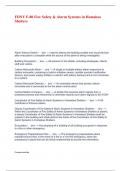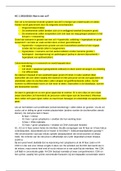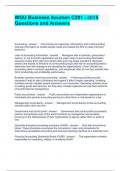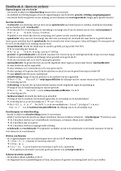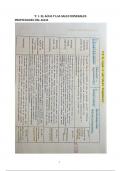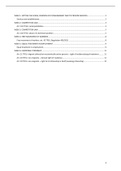QUESTION 1
1.1 Natural law can be defined in more than one way. The first one is based on
human-made law and the second one is derived from God. In African law, God is
considered both the beginning and the end. He leads to the moral compass of the
population. Furthermore, being guided by God, the community created their own
moral code to enhance their bond and maintain the distinctiveness of society.
Culture and tradition of society enhance these moral principles.
1 An eternal, unchanging and universal part and a temporal, changing and local part.
The eternal, unchanging and universal part, according to these thinkers, is
something that is variously called an ideal, or a form, or religious rules, or tribal
customs. This eternal aspect of reality cannot be seen, touched or observed but it is
the perfect example of how things should be. Jean Paul2 contended that the nature
are contingent on God. However, as God is non-existent, there is also nonexistence
of natural law. He believes that the law is their own being as there is no pre-existing
essence for them. Despite being human, we are not guided by dive justice on what
we should do. People have complete freedom to become anything they choose. He
described freedom as negation. He stated that the only existing law was positive law.
God`s existence cannot be proven so there is no basis for natural rights, but humans
determine what should happen and how to govern. The positive law holds ultimate
power. Paul never brings up anything related to ethics. Morality determined by the
standards by which a man should adhere. Justice both empowers and oppresses
different social classes
(2). Law serves as the basis of the devine system of governence or fairness. Sabine
(3) believes that the illegitimate leader violates more than just human rights.
However, go against the devine justice of God. His philosophy was founded on a
double argument. The initial aspect is that the law originates from God. God is non-
existance, there is also no existence of natural law. He believes that law is a form of
idealism that is tested through experimentation. Individuals must construct their own
being as there is no pre-existing essence for them. Despite being human, we are not
guided by devine justice on what we should do. People have complete freedom to
become anything they chose. He described freedom as nation. He stated that the
only existing law was positive law. The earliest known proponents of the idea of
natural law are the ancient Greek philosophers Plato3 and Aristotle
4 . In answer to our first question (the ontological question) both Plato and Aristotle
accepted the existence of a metaphysical world, but Plato called this Ideals and
Aristotle called it Forms. For Plato everything we can 1 UNISA LJU 4801 study guide
pg 65 2 Elijah Akinbode. Jean-Paul Sartre’s Existential Freedom: A Critical Analysis.
International Journal of European Studies. Vol. 7, No. 1, 2023, pp. 15-18. doi:
10.11648/j.ijes.20230701.13 3 Plato’s ideas on natural law can mostly be found in
Plato De republica (Loeb Classical Library London 1930 – 1939) Book VII 4 Aristotle
Metaphysics Translated by Tredennick H (Harvard University Press Cambridge
Mass 1935) Book I. observe with our senses is nothing more than a (bad) copy of
the eternal Ideal, while the Ideals were permanent and indestructible. Aristotle
emphasised that nothing ever consists only of material components.
, 5 Probably the most important natural law thinker of the medieval period was
Thomas Aquinas
6 .Aquinas, like all natural lawyers, argued that there are two realms: the
metaphysical realm of the Christian God and the physical realm of humans. For him
the world is governed by God and, because God is eternal, the law by which he
governs must also be eternal.
7 God creates the eternal law, but humans cannot know that law because they
cannot know God. So God reveals it to humans through the natural law and gives
them the ability to understand that law. Thus, Aquinas uses the idea of logic and
understanding, just like Aristotle. Human law that is not in accordance with natural
law is not law but a distortion.
8 It is not only the Catholics that were of this view. It is found amongst Protestants as
well. As we’ve already said, Grotius was influenced by the Spanish moral
philosophers9Grotius accepted the idea of natural law and argued that natural law
can be seen in four functions of the law, namely
(1) the protection of ownership;
(2) the enforcement of agreements;
(3) the awarding of compensation; and
(4) punishment if these principles are transgressed.
In this regard Grotius was probably also influenced by the Roman jurist Ulpian. The
successes in the natural sciences led to a movement to make the social sciences as
“scientific” as the natural science. This was what prompted August Comte to propose
an approach called positivism in the field of sociology.
10 This, in turn, infuenced the English law reformers called the Utilitarians and their
work eventually led to the idea of legal positivism. We have already said that legal
positivists reject metaphysics. This leads to the first main idea in legal positivism,
namely that facts and values must be separated from each other. You can clearly
see that this is a rejection of natural law. Legal positivists do not think that law is
based on some set of eternal and unchanging rules. For them, law must be based on
facts and judges must decide cases based on the facts and not on something like
morality. They argue that terms like “rights” and “duties” 5 Aristotle Metaphysics
Translated by Tredennick H (Harvard University Press Cambridge Mass 1935) Book
I. 6 On Tomas Aquinas, see Tarnas Passion 179 – 188; Russell History of Western
philosophy 444 – 454; Kelly History 126 – 128. 7 Aquinas T Summa Theologica
(Vollständige, ungekürtzte deutsch-lateinische Ausgabe) (Herausgegeben von der
Philosophisch- Hochschule Walbergen bei Köln Graz Wien-Koln 1977) 2. 8 Aquinas
Summa Theologica 2.1.90.2. 9 Grotius was specifi cally infl uenced by Francisco
Suarez who argued that the ius gentium (the basis for International law) was the
closest to natural law – see Suarez F De legibus (Antwerp Publisher unknown 1613)
2.6. 10 See Andreski S (ed) The essential Comte: selected from Course de
philosophie positive Translated from the French by M Clarke (Croom Helm London
1.1 Natural law can be defined in more than one way. The first one is based on
human-made law and the second one is derived from God. In African law, God is
considered both the beginning and the end. He leads to the moral compass of the
population. Furthermore, being guided by God, the community created their own
moral code to enhance their bond and maintain the distinctiveness of society.
Culture and tradition of society enhance these moral principles.
1 An eternal, unchanging and universal part and a temporal, changing and local part.
The eternal, unchanging and universal part, according to these thinkers, is
something that is variously called an ideal, or a form, or religious rules, or tribal
customs. This eternal aspect of reality cannot be seen, touched or observed but it is
the perfect example of how things should be. Jean Paul2 contended that the nature
are contingent on God. However, as God is non-existent, there is also nonexistence
of natural law. He believes that the law is their own being as there is no pre-existing
essence for them. Despite being human, we are not guided by dive justice on what
we should do. People have complete freedom to become anything they choose. He
described freedom as negation. He stated that the only existing law was positive law.
God`s existence cannot be proven so there is no basis for natural rights, but humans
determine what should happen and how to govern. The positive law holds ultimate
power. Paul never brings up anything related to ethics. Morality determined by the
standards by which a man should adhere. Justice both empowers and oppresses
different social classes
(2). Law serves as the basis of the devine system of governence or fairness. Sabine
(3) believes that the illegitimate leader violates more than just human rights.
However, go against the devine justice of God. His philosophy was founded on a
double argument. The initial aspect is that the law originates from God. God is non-
existance, there is also no existence of natural law. He believes that law is a form of
idealism that is tested through experimentation. Individuals must construct their own
being as there is no pre-existing essence for them. Despite being human, we are not
guided by devine justice on what we should do. People have complete freedom to
become anything they chose. He described freedom as nation. He stated that the
only existing law was positive law. The earliest known proponents of the idea of
natural law are the ancient Greek philosophers Plato3 and Aristotle
4 . In answer to our first question (the ontological question) both Plato and Aristotle
accepted the existence of a metaphysical world, but Plato called this Ideals and
Aristotle called it Forms. For Plato everything we can 1 UNISA LJU 4801 study guide
pg 65 2 Elijah Akinbode. Jean-Paul Sartre’s Existential Freedom: A Critical Analysis.
International Journal of European Studies. Vol. 7, No. 1, 2023, pp. 15-18. doi:
10.11648/j.ijes.20230701.13 3 Plato’s ideas on natural law can mostly be found in
Plato De republica (Loeb Classical Library London 1930 – 1939) Book VII 4 Aristotle
Metaphysics Translated by Tredennick H (Harvard University Press Cambridge
Mass 1935) Book I. observe with our senses is nothing more than a (bad) copy of
the eternal Ideal, while the Ideals were permanent and indestructible. Aristotle
emphasised that nothing ever consists only of material components.
, 5 Probably the most important natural law thinker of the medieval period was
Thomas Aquinas
6 .Aquinas, like all natural lawyers, argued that there are two realms: the
metaphysical realm of the Christian God and the physical realm of humans. For him
the world is governed by God and, because God is eternal, the law by which he
governs must also be eternal.
7 God creates the eternal law, but humans cannot know that law because they
cannot know God. So God reveals it to humans through the natural law and gives
them the ability to understand that law. Thus, Aquinas uses the idea of logic and
understanding, just like Aristotle. Human law that is not in accordance with natural
law is not law but a distortion.
8 It is not only the Catholics that were of this view. It is found amongst Protestants as
well. As we’ve already said, Grotius was influenced by the Spanish moral
philosophers9Grotius accepted the idea of natural law and argued that natural law
can be seen in four functions of the law, namely
(1) the protection of ownership;
(2) the enforcement of agreements;
(3) the awarding of compensation; and
(4) punishment if these principles are transgressed.
In this regard Grotius was probably also influenced by the Roman jurist Ulpian. The
successes in the natural sciences led to a movement to make the social sciences as
“scientific” as the natural science. This was what prompted August Comte to propose
an approach called positivism in the field of sociology.
10 This, in turn, infuenced the English law reformers called the Utilitarians and their
work eventually led to the idea of legal positivism. We have already said that legal
positivists reject metaphysics. This leads to the first main idea in legal positivism,
namely that facts and values must be separated from each other. You can clearly
see that this is a rejection of natural law. Legal positivists do not think that law is
based on some set of eternal and unchanging rules. For them, law must be based on
facts and judges must decide cases based on the facts and not on something like
morality. They argue that terms like “rights” and “duties” 5 Aristotle Metaphysics
Translated by Tredennick H (Harvard University Press Cambridge Mass 1935) Book
I. 6 On Tomas Aquinas, see Tarnas Passion 179 – 188; Russell History of Western
philosophy 444 – 454; Kelly History 126 – 128. 7 Aquinas T Summa Theologica
(Vollständige, ungekürtzte deutsch-lateinische Ausgabe) (Herausgegeben von der
Philosophisch- Hochschule Walbergen bei Köln Graz Wien-Koln 1977) 2. 8 Aquinas
Summa Theologica 2.1.90.2. 9 Grotius was specifi cally infl uenced by Francisco
Suarez who argued that the ius gentium (the basis for International law) was the
closest to natural law – see Suarez F De legibus (Antwerp Publisher unknown 1613)
2.6. 10 See Andreski S (ed) The essential Comte: selected from Course de
philosophie positive Translated from the French by M Clarke (Croom Helm London

